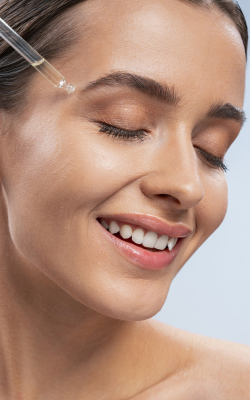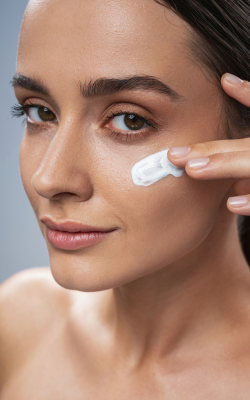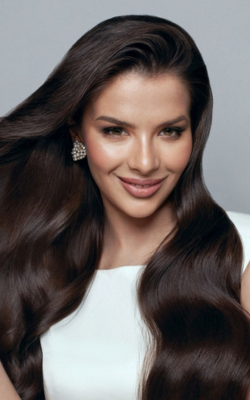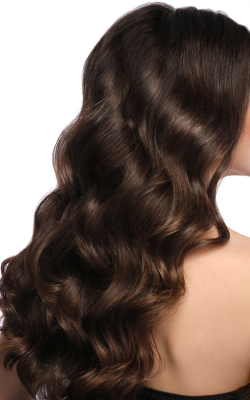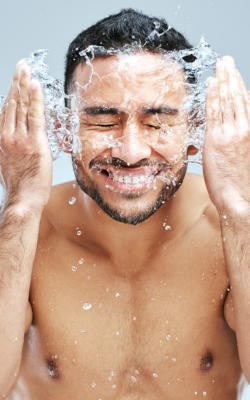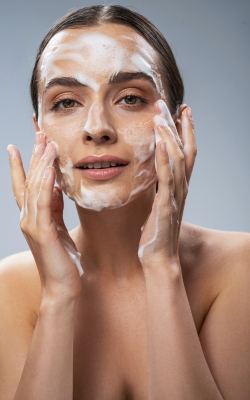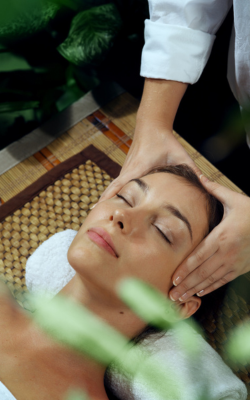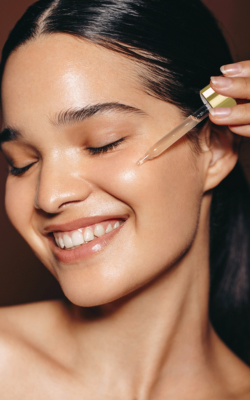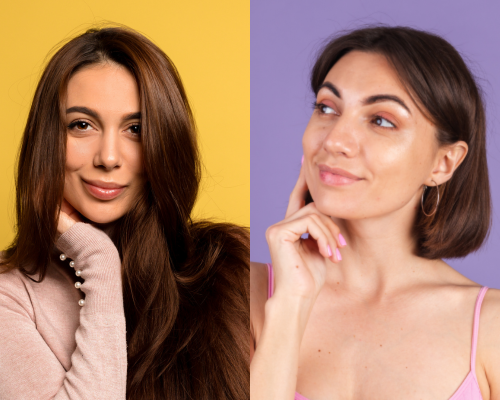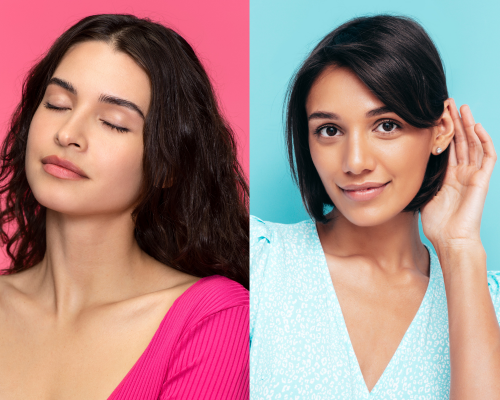Designed with you in mind
Oily scalp
Dandruff
Product Build-up
Thin-Flat Hair
Get to the Root of the Problem
Hormones
Hormonal deficiencies or imbalances can disrupt the normal balance of sebum production & result in excessive oiliness, dandruff & thinning hair.
Nutrition
Poor nutrition can affect scalp barrier strength & hygiene as dietary intake may not always provide adequate nutrients for healthy hair & scalp.
Overactive Sebum Glands
Overactive sebum glands lead to excessive sebum/oil production, which can weigh down hair, causing thinness & greasiness, & contribute to dandruff.
Lifestyle
Excessive use of leave in products, treatments and heat styling tools & Infrequent or improper hair washing can lead to inflamed & irritated scalp, causing dandruff, dermatitis or psoriasis.
Scalp Health
Excessive leave in products & Infrequent or improper hair washing can lead to inflamed and irritated scalp, causing dandruff, dermatitis or psoriasis.
Medication
Certain medications can disrupt normal sebum production and lead to excess sebum/oily, dandruff-prone, and thin flat hair
Get to the Root Causes
Hormones
Hormonal deficiencies or imbalances can disrupt the normal balance of sebum production & result in excessive oilliness, dandruff & thinning hair.
Nutrition
Poor nutrition can affect scalp barrier strength & hygiene as dietary intake may not always provide adequate nutrients for healthy hair & scalp.
Overactive Sebum Glands
Overactive sebum glands lead to excessive sebum/oil production, which can weigh down hair, causing thinness & greasiness, & contribute to dandruff.
Lifestyle
Excessive use of leave in products, treatments and heat styling tools & Infrequent or improper hair washing can lead to inflamed & irritated scalp, causing dandruff, dermatitis or psoriasis.
Scalp Health
Excessive leave in products & Infrequent or improper hair washing can lead to inflamed and irritated scalp, causing dandruff, dermatitis or psoriasis.
Medication
Certain medications can disrupt normal sebum production and lead to excess sebum/oily, dandruff-prone, and thin flat hair.
Get Fuller, Stronger Hair

Our product invigorates the scalp by balancing sebum production, and combats dandruff, resulting in a refreshed & healthy scalp.
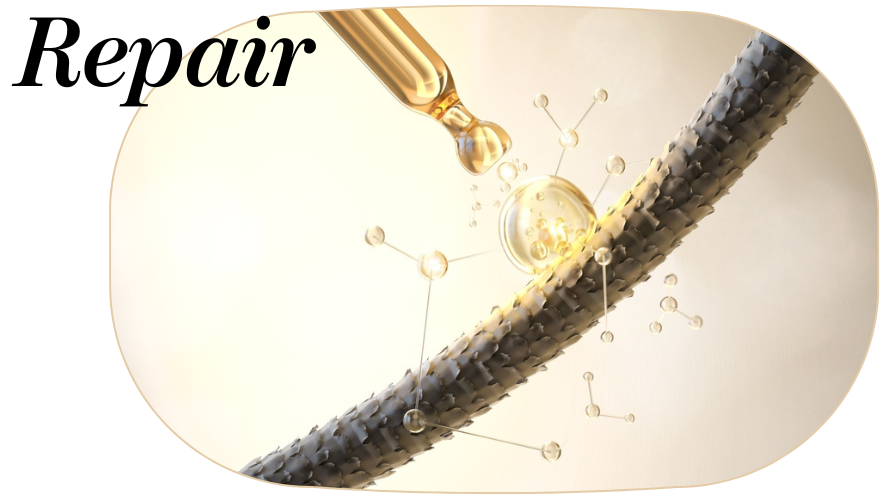
Our products increase the survival rate, prevent breakage, & repair damage to newly formed hair fibres by strengthening & thickening them.

Our products strengthen newly grown hair by reinforcing hair fibres, providing essential nourishment to support healthy growth.

Our product invigorates the scalp by balancing sebum production, and combats dandruff, resulting in a refreshed & healthy scalp.

Our product invigorates the scalp by balancing sebum production, and combats dandruff, resulting in a refreshed & healthy scalp.

Our products strengthen newly grown hair by reinforcing hair fibres, providing essential nourishment to support healthy growth.
Unbeatable Benefits -
You've Been Looking For
By incorporating our Avocado & Tea Tree Oil Conditioner into your
daily routine, you can take the first step towards achieving the full, fresh, beautiful hair
you've always wanted.

Combats Hair Dandruff

Renews Hair Bond

Reduces Excess Sebum Production

Relives Scalp Itchiness

Reduces Hair Breakage

Repairs Damage + Split-Ends

Repairs Hair Thinning

Adds Shine & Luster
Unbeatable Benefits -
You've Been Looking For
By incorporating our Avocado & Tea Tree Oil Conditioner into your daily routine, you can take the first step towards achieving the full, fresh, beautiful hair you've always wanted.

Combats
Hair Dandruff

Renews
Hair Bond

Reduces Excess
Sebum Production

Relives Scalp
Itchiness

Reduces
Hair Breakage

Repairs Damage +
Split-Ends

Repairs Hair
Thinning

Adds Shine
& Luster
Unbeatable Benefits -
You've Been Looking For
By incorporating our Avocado & Tea Tree Oil Conditioner into your daily routine, you can take the first step towards achieving the full, fresh, beautiful hair you've always wanted.

Combats Hair Dandruff

Renews Hair Bond

Reduces ExcessSebum Production

Relives Scalp Itchiness

Reduces Hair Breakage

Repairs Damage + Split-Ends

Repairs Hair Thinning

Adds Shine & Luster
Boosted by Power of Natural Ingredients

Avocado oil provides essential nutrients, antioxidants, & fatty acids that nourish & moisturize the hair, promote scalp health, reduces frizz, enhances shine, & supports hair growth, making it an excellent ingredient for overall hair repair.

Tea tree oil has antifungal & antimicrobial properties that help to eliminate dandruff & prevent scalp infections. It also has a soothing & cooling effect on the scalp, making it beneficial for reducing itchiness & irritation.

Argan oil, also called Moroccan oil, is a champion at taming frizz, restoring & strengthening weak & brittle hair, revives healthy shine & softness. It deeply moisturizes without being heavy or greasy.

Almond oil is rich in vitamins and minerals that promote healthy hair growth and nourishment. Its moisturizing properties prevent dryness and breakage, while also adding shine and reducing scalp inflammation.

Aloe Vera has soothing and cooling properties that relieve redness, irritation and itchiness, Aloe Vera helps in moisturizing and soothing the skin, reducing inflammation, and promoting wound healing.
Real Results, Visible Transformation


See the Difference
In only one rinse off application *
* For better results follow full Deep Cleansing Regime for 3 months.
Real Results, Visible Transformation


See the Difference
In only one rinse off application *
* For better results follow full Deep Cleansing Regime for 3 months.
Nature's Best Quality Assured, Always!
Experience the Future of Hair Health with our products - because nature knows what's best for Strong, Healthy Hair. By choosing natural products, you're not only avoiding harsh chemicals and synthetic ingredients, but you're also investing in the long-term health of your hair. Our products are thoughtfully formulated by following the highest quality standards to provide you with the best care.














Zero Tolerance For Harmful Ingredients
When it comes to your health, there should be no exceptions. We don't settle for short-term relief at the expense of your long-term well-being. We choose to prioritize your health so that you never have to compromise.
Ingredients used in cosmetics and skincare as emulsifiers, gelling agents, or film formers. Some acrylates can be microplastics and accumulate in the environment, contributing to harm, and some can contribute to sensitized skin.
A byproduct of coal processing that is a known carcinogen. It is used as a colorant and an anti-dandruff agent. Found in: hair dye, shampoo. a byproduct of coal processing that is a known carcinogen. Potential to cause cancer and can be contaminated with heavy metals toxic to the brain.
Solvent that can cause skin irritation, dryness, and may have negative environmental impact. May exacerbate acne and other skin conditions.
Solvent that can cause skin irritation, dryness, and may have negative environmental impact. May exacerbate acne and other skin conditions.
A white or colourless soft solid derivable from petroleum, coal or oil shale. Since its smooth texture, it is usually used in lotions and creams. Overall paraffin is not good to skin since it is easily rubbed into skin and can cause clogged pores.
You will rarely see “petrolatum” listed anymore. However its by-products are often listed. We’ve included a list of a few glaringly concerning petroleum derivatives below. But sometimes, petroleum is actually listed, but clever marketers will disguise the name, we’ve tried to include all of the synonyms below. Contaminants from hydrocarbons, and the processing of crude oil: Toluene, Hexane, Mineral Oil, Paraffin Wax, Benzene, Mineral oil, Liquid paraffin.
Used to stabilize products and bind ingredients. It can break down into acrylamide which has been shown to be a carcinogen and has been linked to cancers of the thyroid, uterus, mammary glands, and others in animal studies. Daily exposure to acrylamide through cosmetic products can be compared to the amount one is exposed to when smoking a pack of cigarettes a day. Found in: moisturizers, anti-aging products, hair products, and others.
An airplane adhesive, sometimes derived from petroleum. It is a common toxic ingredient used in lipsticks and balms, as a binder.
Derived from petrochemicals. May contain phthalates, which are known as possible endocrine disruptors.
An ingredient that helps product from clumping together. It has been associated with cancer and delayed menstruation and breast development. PTFE is most notably known as the ingredient used by Teflon for non-stick cookware. PTFE itself is created with perfluorooctonoic acid (PFOA) which has been shown to increase carcinogenicity of chemicals it is blended with. Found in: foundation, loose powder, bronzer, blush, eye shadow, mascara, lip balm, and others.
Propylene Carbonate functions as a solvent in cosmetics and personal care products. Undiluted Propylene Carbonate was moderately irritating to the eye and skin.
Propylene Carbonate functions as a solvent in cosmetics and personal care products. Undiluted Propylene Carbonate was moderately irritating to the eye and skin.
Used in cosmetics as a bulking agent and can cause lung irritation when inhaled.
Silicones are included as an ingredient to adjust the texture, make the skin feel smooth, fill in wrinkles, and add shine and glow. They have been shown to bio-accumulate, meaning they do not biodegrade and may cause environmental damage. They are also occlusive, meaning they will clog pores. So if you are acne prone, it may be best to stay away from products that list this as an ingredient.
There is a potential for reproductive toxicity and endocrine disruption with this class of silicones. Studies suggest they are also persistent in the environment, and may build up in the food chain.
Used as a stabilizer in personal care products. Used to be used as a pain and fever reliever until banned in 1983 by the FDA due to its carcinogenic effects. Found in: facial hair bleach, hair color, and hair removal products. Used to give structure to certain cosmetics and skincare products. Styrene is a known carcinogen so residual styrene monomers may contaminate the raw material used.
A volatile petrochemical solvent that is toxic to the immune system and can cause birth defects. It can also decrease one’s ability to breathe and cause them to feel nauseous. Found in: nail polish, hair bleaches and dyes.
An ingredient extracted from insects used to pigment makeup, especially lip color, with red coloring.
Among the eight most common allergens. Can cause allergic reactions and discomfort in some individuals.
Among the eight most common allergens. Can cause allergic reactions and discomfort in some individuals.
Gelatin is often made from animal products.
Extracted from animal tissues such as rooster combs or cow eyes. Used in moisturizers, serums, and injectables to plump and hydrate skin Potential for allergic reactions in sensitive individuals. We use plant-derived Hyaluronic acid instead.
Keratin is used for strengthening hair and nails, and improves skin texture. Keratin is often made from animal hooves, horns, feathers, and wool. We use plant-derived Keratin instead.
Lanolin is extracted from sheep’s wool, and doesn’t involve physical harm to the animal.
Among the eight most common allergens. Can cause allergic reactions and discomfort in some individuals.
In the form of powder, aluminium is usually used in self-care products like deodorants. It can cause irritation to skin, and birth disorders and has been linked to alzheimer’s.
Known carcinogen and can bioaccumulate on the top layers of your skin. Can affect reproductive systems.
Heavy metal that can damage the nervous system and kidneys. Linked to skin irritation, allergic reactions, and other health problems.
Often used in cleaning products as it helps to dissolve soil particles in water, leaving cleaner surfaces. However, there are significant concerns around its use in the home - not only can ammonia be irritating to the eyes and skin, it can also be severely irritating to the respiratory tract if inhaled.
A disinfectant used as a preservative and surfactant associated with severe skin, eye and respiratory irritation and allergies.
An artificial preservative that can become carcinogenic when mixed with Vitamin C.
A possible human carcinogen and hormone disruptor used as a fragrance ingredient and to absorb ultraviolet light.
Environmental pollutant, low biodegradability, toxic to aquatic life, possible endocrine disruptor.
Preservative that releases formaldehyde, linked to skin irritation, allergies, and carcinogenic effects.
An inorganic compound which can be irritating to the skin. It is used to give mineral makeups a matte or shimmery appearance. Since it helps the mineral to adhere to the skin, Bismuth Oxychloride can also clog pores and causing acnes and blackheads.
These chemicals are commonly used in plastics, including those used in cosmetics packaging. BPA, BPB, BPE, BPF, BPS, and HPP have been linked to endocrine disruption and reproductive harm. The use of bisphenols in cosmetics is banned in the EU.
Preservative that may cause skin irritation, allergic reactions, and release formaldehyde, a carcinogen, when combined with other chemicals.
A solvent used to control viscosity, or a “fragrance” additive. It irritates skin and may cause cancer and reproductive toxicity.
An artificial preservative that builds up in the lungs, liver, and kidneys and has been linked to stomach tumors in animal studies.
A solvent used in cosmetics that can cause skin irritation and is linked to developmental and reproductive toxicity.
An ingredient found in eyeliners, it’s linked to cancer and organ toxicity. Look for its other names: channel black, pigment black 6, pigment black 7, acetylene black, froflow, arogen, arotone, arovel, arrow, atlantic, and black pearls.
Direct contact with chlorine bleaches can cause skin irritation or eye irritation, toxic if inhaled or swallowed, highly toxic to aquatic life.
Used as thickening and binding agent in cosmetics. It was originally used as an additive to gasoline and is known as an aerosol spray propellant and anesthetic. It has been shown to cause liver and kidney damage or uterine cancer in mice after prolonged exposure.
CAPB is a surfactant (cleanser) commonly used in personal care products. It is linked to allergic responses and/or skin irritation
Used on skin to help prevent signs of aging. It is typically used as a medication to treat ADHD, Alzheimer’s, and Autism but has recently gained traction in being used for anti-aging despite lack of evidence that it works. Found in: anti-aging products.
Used as a solvent and plasticizer in cosmetics, including nail polish, and hair care products. Known to be an endocrine disruptor, linked to reproductive and developmental toxicity, skin and eye irritation.
Solvent and humectant that can cause skin irritation, allergies, and dryness, particularly in high concentrations.
Disodium EDTA is a chelating agent that can cause skin irritation and sensitivity. May contain impurities linked to cancer as it. Disodium EDTA is made from ethylenediamine, formaldehyde, and sodium cyanide. Ethylenediamine, formaldehyde, and sodium cyanide are toxic chemicals that is strictly prohibited for use in cosmetic products in the EU.
Used as a preservative to prevent bacterial growth in cosmetics. Made from reaction between formaldehyde and dimethylhydantoin. May release formaldehyde, which is a known human carcinogen and can cause skin irritation.
Surfactants and pH adjusters linked to allergies, skin toxicity, hormone disruption, and inhibited fetal brain development. Can react to form cancer-causing nitrosamines. Harmful to fish and other wildlife.
A binding agent used to improve stability in moisturizers but may be toxic to organs.
Artificial colors and dyes have in some cases been linked to illness and allergies. FD&C numbered color pigments also frequently contain aluminum.
Colorless, strong-smelling gas. Commonly found in nail polish, nail glue, eyelash glue, hair gel, hair-smoothing products, baby shampoo, body soap, body wash, color cosmetics. Known human carcinogen. Linked to organ toxicity, and a known respiratory toxicant. May cause skin irritation.
Artificial substance that can be used as a solvent, preservative, or sweetener. Can be toxic to the kidneys, liver, and nervous system.
Genetically modified organisms.
Hydrogen peroxide is a chemical compound used for its disinfectant, antiviral and antibacterial properties in a range of consumer products. It is a known skin irritant and may be harmful if inhaled at moderate or high concentrations. Its use in cosmetics is banned in Japan, and restricted in both Canada and the EU.
Often used for skin-lightening cosmetics because of its ability to inhibit melanin production, hydroquinone is linked to cancer, organ toxicity, and skin irritation.
Solvent used in cosmetics that can cause skin irritation and is linked to developmental and reproductive toxicity.
These preservatives cause skin irritation, sensitivity, and allergies more commonly than most others on the list.
Chemical preservatives that are among the most common irritants, sensitizers, and causes of contact skin allergies. Found in: shampoo, conditioner, body wash.
Ingredients used in makeup and skincare, commonly as emulsifiers, gelling agents, or film formers. Microplastics can accumulate in the environment and contribute to environmental harm.
An emulsifier for products. Inhalation is poor for the respiratory tract and can induce asthmatic symptoms. It is deemed a potential neurotoxin as well. Found in hair color and household cleaning products.
Ingredients used to bring down the white cast of mineral sunscreens. They may be harmful to human health and have been shown to hurt the environment. Nanoparticles are between 1 and 100 nanometers in size. Because they're so small, they could get absorbed more easily through the skin.
A nitrosamine impurity. NDMA is classified as a probable human carcinogen based on results from laboratory tests. NDMA is a known environmental contaminant and found in water and foods, including meats, dairy products, and vegetables.
A conditioning agent used in hair care products that can cause skin irritation and allergic reactions
An agent used to protect from ultraviolet rays. It is linked to irritation and allergies. Found in: sunscreen, moisturizer
A sunscreen ingredient that can cause skin irritation and potentially trigger allergic reactions in some individuals.
Linked to hormone disruption, reproductive toxicity, neurotoxicity, and skin irritations.
A preservative and fragrance ingredient that is linked to cancer, skin irritation, and toxicity to the kidneys and liver.
Derived from ether alcohol, it is a synthetic compound that contains carcinogenic chemicals therefore not advisable for long term usage.
Linked to hormone disruption. May be harmful to reproductive organs.
A hair colorant often used in hair dyes. PPD can be highly sensitizing, and some studies link it to lupus, renal failure, non-Hopkins lymphoma and asthma.
A synthetic preservative that can cause asthmatic reactions and stomach irritation.
Preservative that releases formaldehyde, a carcinogen, and can cause skin irritation, allergic reactions, and contact dermatitis.
A colorant and fragrance ingredient that is a skin irritant, toxic to the immune system and organs, and suspected to cause hormone disruption. Mostly used in hair dyes. Occasionally however they may be used into acne treatments to help smooth scaly, uneven skin. The EU, Japan and even the US has restricted their use.
This is an antifungal medication that can lead to skin irritation and hair loss. It has been linked to cancer.
An artificial preservative that can become carcinogenic when mixed with Vitamin C in large amounts.
It is extremely irritating to the skin and eyesi and can also form chlorinated VOCs such as carbon tetrachloride. These are powerful greenhouse gases and possible carcinogens. Used in household cleaners and disinfectants.
SLS and SLES are surfactants that can cause skin irritation or trigger allergies. SLES is often contaminated with 1,4-dioxane, a byproduct of a petrochemical process called ethoxylation, which is used to process other chemicals in order to make them less harsh. Found in: shampoo, body wash, bubble bath.
Preservatives that, when added in manufacturing, can induce asthma in sulfite-sensitive populations.
Some synthetic perfumes are associated with allergies, dermatitis, respiratory irritation and potential effects on the hormonal system, and can persist in the environment.
A mineral that is mined from underground. Talc carries the risk of being contaminated with Asbestos, because Asbestos is also found underground, and veins of it have frequently appeared in Talc deposits.
A moisturizing agent that can cause skin irritation and allergic reactions.
Triclosan is a skin, eye and lung irritant. It has associated health concerns and has the ability to persist in the environment and bio accumulate.
Triclosan is a skin, eye and lung irritant. It has associated health concerns and has the ability to persist in the environment and bio accumulate.
Trisodium EDTA is a chelating agent that can cause skin irritation and sensitivity. May contain impurities linked to cancer as it. Trisodium EDTA is made from ethylenediamine, formaldehyde, and sodium cyanide. Ethylenediamine, formaldehyde, and sodium cyanide are toxic chemicals that is strictly prohibited for use in cosmetic products in the EU.
A pH adjuster and buffering agent that has low toxicity but can cause skin irritation in some individual
Solvent that can cause skin and eye irritation. May cause headache, dizziness, and nausea. Harmful to fish and other wildlife.
How To Use

Use on wet hair right after shampoo

Apply conditioner to hair, and work through ends. Wait for 3-5 minutes to moisturize hair strands.

Rinse thoroughly and towel dry your hair gently. Avoid rubbing hair vigorously with a towel as this can cause hair breakage.
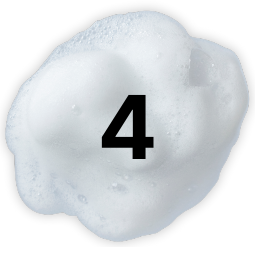
Enjoy your renewed hair.

LAFAYRE Expert Tips
Apply conditioner to mid-lengths and ends, leave for a few minutes before rinsing. Detangle while conditioning to easily remove knots.
Use: Coin-sized amount of conditioner for short hair and walnut-sized amount of conditioner for long hair.
Dry Hair: Use after 4 - 5 days
Normal Hair: Use after 3 days
Dandruff/Oily Hair: Use after 2 days
For long-lasting results : Use our products consistently for at least three months.
How Do We Compare To Others?
After conducting a thorough comparison of Our Avocado & Tea Tree Oil Deep Cleansing Conditioner with other products in the market, we can confidently say that Our Avocado & Tea Tree Oil Conditioner stands out from the others. Here are the reasons why Our Avocado & Tea Tree Oil Conditioner is superior:

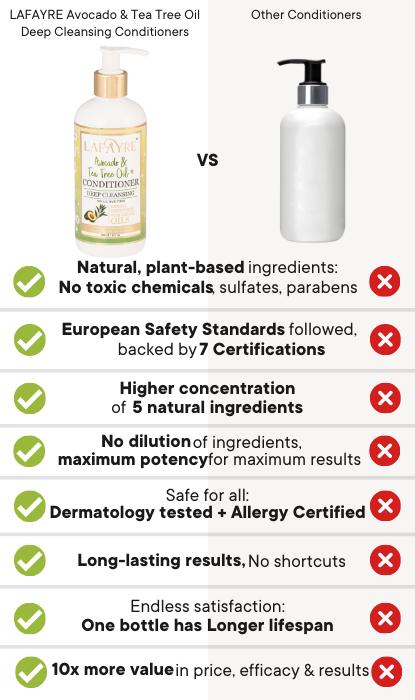
Know your Hair Type :
A Step-By-Step Guide
With so many hair care products on the market, it can be overwhelming to determine which ones are best suited for your hair type. The first step is finding out your hair type in order to choose the right products and care routine for your hair. If you're struggling to determine your hair type, don't worry as we have a comprehensive tutorial that can guide you.
Click here to access itFrequently Asked Questions (FAQs)
Hair fall can be caused by a variety of factors, including genetics, hormonal imbalances, nutritional deficiencies, and certain medical conditions. Stress, pollution, and harsh hair treatments can also contribute to hair fall. At LAFAYRE, we offer products formulated with natural ingredients and plant-based base that are known to address these factors and promote healthy hair growth.
There are several ways to prevent hair fall, such as maintaining a healthy diet, managing stress through exercise and relaxation techniques, using gentle hair care products, and avoiding harsh treatments such as excessive heat styling. At LAFAYRE, we offer products formulated with natural ingredients that are known to nourish and strengthen hair, helping to reduce hair fall.
When it comes to hair fall control, there are several oils that can be beneficial, including coconut oil, almond oil, castor oil, and bhringraj oil. However, bhringraj oil stands out as one of the best oils for hair fall control.
Bhringraj oil is derived from the leaves of the bhringraj plant, which is also known as false daisy. It has been traditionally used in Ayurvedic medicine for hair growth and hair fall control. Bhringraj oil is rich in nutrients like vitamin E, iron, and magnesium, which help nourish the hair follicles and promote healthy hair growth.
Studies have also shown that bhringraj oil has anti-inflammatory and antioxidant properties, which can help reduce hair fall caused by inflammation or oxidative stress. Additionally, bhringraj oil can help improve blood circulation in the scalp, which is crucial for healthy hair growth.
At LAFAYRE, we offer 100% pure bhringraj oil that is specially formulated to nourish and strengthen the hair. Our bhringraj. We recommend using our bhringraj oil regularly as a part of your hair care routine to promote healthy hair growth and control hair fall.
Indeed, stress can contribute to hair loss. The hormone cortisol is released when we are stressed, which can disrupt the normal hair growth cycle and cause excessive shedding or hair loss. Additionally, stress-related behaviors like pulling or twisting hair can also lead to hair fall.
Thankfully, there are various ways to address stress-related hair loss. One of these is by integrating essential oils, such as lavender and rose geranium oil, into your hair care routine. These essential oils are known for their calming properties and may help in reducing stress levels.
To use lavender and rose geranium oil for hair care, blend a few drops of each with a carrier oil like coconut or jojoba oil, and massage the mixture into your scalp. You can also add a few drops to your shampoo or conditioner for extra benefits.
However, it's crucial to use essential oils in moderation and with caution, as they can cause adverse reactions if not used correctly.
Dealing with hair loss and bald patches can be a difficult experience, but there are several ways to encourage hair regrowth.
Below are some helpful tips to regrow hair on bald patches:
1. Essential Oil Therapy Treatment: essentials oils are medicinal extracts of plants & herbs that aid in hair regrowth by enhancing blood flow to the scalp and promoting hair growth.
2. LAFAYRE’s Hair Growth Therapy Regime: Follow our full Hair Growth Therapy Regime for 3 to 6 months (depending on the extent of balding & hair fall) to stimulate hair growth.
3. Maintain a Nutritious Diet: Consuming a balanced diet rich in vitamins and nutrients can boost healthy hair growth. Biotin, vitamin D, and iron are among the necessary nutrients for healthy hair.
4. Follow a Healthy Hair Care Routine: Proper hair care habits can prevent hair loss and promote hair regrowth. Avoid tight hairstyles, harsh chemicals, and use gentle hair care products.
5. Analyse your lifestyle: Hair fall & bald patches can be caused due to lifestle habits such as like stress, diet, sleeping patterns, hair styling & coloring. It is important to analyse your lifestyle and check for bad habits that may be causing your hair fall & bald patched.
It is vital to remember that hair regrowth can take time and patience. Consistently and properly using these remedies can result in visible hair growth over time. If you have any concerns about hair loss or bald patches, it is always best to seek advice from a healthcare professional.
To prevent hair fall while washing your hair, avoid using hot water, harsh shampoos, and scrubbing too vigorously. Use our Onion Oil & Shikakai Shampoo and conditioner designed for your hair type, and don't forget to condition the ends.
To minimize hair fall while styling, begin with a high-quality hairbrush, minimize the use of heat styling tools, and choose looser hairstyles. Incorporating essential oils and avoiding tight hair ties can also promote healthier hair growth and reduce hair loss.
While shedding hair is typical, losing more than 100 strands per day could be a sign of excessive hair fall. Other indicators are thinner hair, widening part, or bald patches. If you have concerns, seek advice from a healthcare professional.
Yes, natural haircare products can help prevent hair fall by nourishing the scalp and hair follicles with essential nutrients.
Here are some of the best home remedies for hair fall:
1. Aloe Vera: Aloe vera is a natural moisturizer and has anti-inflammatory properties that can help reduce hair fall. Apply aloe vera gel on your scalp and leave it on for about 30 minutes before washing it off with a mild shampoo.
2. Coconut Oil: Coconut oil is rich in fatty acids that can help nourish your hair and scalp. Massage warm coconut oil on your scalp and leave it on for a few hours or overnight before washing it off with a mild shampoo.
3. Onion Juice: Onion juice contains sulfur, which can help stimulate hair growth and prevent hair fall. Apply onion juice on your scalp and leave it on for about 30 minutes before washing it off with a mild shampoo.
4. Eggs: Eggs are rich in protein and biotin, which can help promote hair growth and reduce hair fall. Beat an egg and apply it on your scalp. Leave it on for about 30 minutes before washing it off with a mild shampoo.
It is important to note that while these home remedies may help reduce hair fall, many of these remedies require a lot of time and effort, and their results may not be significant or long-lasting. We believe that the best way to address hair fall is through a comprehensive approach that includes a balanced diet, regular exercise, and using high-quality hair care products that are designed to nourish and strengthen hair. Our products are formulated with powerful natural ingredients that are proven to support healthy hair growth and reduce hair fall.
Absolutely, natural hair care products can play a significant role in reducing stress-related hair fall. Essential oils like lavender and rose geranium have calming properties that can help to alleviate stress levels, which in turn can decrease hair fall.
Moreover, natural hair care products usually avoid using harsh chemicals and synthetic ingredients that can negatively impact hair and scalp health. Instead, they rely on natural ingredients like plant extracts and essential oils to nourish the hair and scalp, which promotes healthy hair growth.
At LAFAYRE, we specialize in natural hair care products that are crafted to support healthy hair growth and reduce hair fall. Our products contain gentle, natural ingredients that are free of harmful chemicals such as sulfates and parabens, making them gentle on hair and scalp.
Natural hair care products can promote healthier hair growth and reduce hair fall, but they cannot reverse hair loss completely. Nevertheless, they can help in nourishing and strengthening the hair, protecting against further damage, and improving scalp health, ultimately leading to a reduction in hair fall over time.
LAFAYRE Onion Oil & Shikakai Shampoo is the ultimate solution for all your hair growth needs! Packed with Plant based base and powerful natural ingredients such as Onion Oil, Shikakai, Reetha, Argan Oil, Fenugreek Oil, Aloe Vera and Vitamin E, this shampoo is sure to give you the luscious locks you've always dreamed of. With the time-tested goodness of onion, it helps to naturally combat hair loss and promotes thicker, stronger, and more radiant hair.
Our hair care products are formulated with safe and natural ingredients, and we have conducted extensive research and testing to ensure that they are both effective and gentle on your hair and scalp. As a result, our products do not have any significant side effects.
Nonetheless, it's essential to perform a patch test before using any new hair care product, especially if you have a sensitive scalp or a history of allergies. Apply a small amount of the product to a small area of your scalp and wait for 24-48 hours to check for any adverse reactions. In rare cases, some individuals may experience mild scalp irritation or allergic reactions to specific ingredients in our products. We highly recommend following the usage instructions on our packaging and using our hair care products as directed.
At LAFAYRE, we believe in using only the best quality and safest ingredients to address hair fall concerns. Plus, we do not believe in using an ingredient just for the sake of claiming it on the label, rather all our products are extremely potent. Some of our key ingredients include :
- Plant-based Certified Toxic Free base
- Onion Oil, Shikakai, Reetha, Argan Oil, Fenugreek Oil, Aloe Vera and Vitamin E
We highly recommend sticking with our natural hair care products for at least three months to allow sufficient time for your hair to adjust and for the nourishing ingredients in our products to take effect. By following our recommended usage guidelines, you can help promote stronger, healthier, and more shiny hair. While outcomes may differ from person to person, we have received feedback from many customers who have seen a reduction in hair fall with consistent use of our products. If you are used to using powerful synthetic hair and skin products, there may be a transition period when switching to natural products. To achieve optimal results, it is important to discontinue the use of such products.
At LAFAYRE, we strongly believe in the effectiveness of our products and are optimistic that consistent use will result in a noticeable reduction in hair fall. Nonetheless, as outcomes may differ from person to person, we do not offer any guarantees or refunds. We suggest you read through reviews from other customers and consult with a hair care professional to determine if our products are suitable for you. We take pride in our all-natural and high-quality hair care formulations, and we are confident that you will enjoy using them.
While results can differ from person to person, numerous customers have shared their positive experiences of using our products consistently, which resulted in a decrease in hair fall and noticeable improvement in hair growth. The duration for seeing visible results may vary from a few weeks to a few months. It's important to note that natural hair care requires patience and persistence, and consistent use of our products as directed can help provide the desired outcomes. We recommend giving our products ample time to work effectively, and we are confident that you will see a significant improvement in the overall health and appearance of your hair with regular use.
Yes, our shampoo is safe for color treated hair. It is formulated with gentle ingredients that will not strip or fade your hair color.
Our hair care products are formulated to be gentle and lightweight, providing a nourishing and refreshing experience without weighing down your hair. However, when it comes to washing hair, the frequency depends on various factors like hair type, lifestyle, and personal preference. If you have an oily scalp, washing your hair daily may be necessary, while others may not require as frequent washing. It's important to find a balance that suits your hair and scalp health, as over-washing can lead to dryness, and under-washing can cause buildup and scalp irritation.


